Odisha Vikash Conclave (OVC) 2024
Transformative Odisha @ 2036: Population & Development.
Date(s): 23/10/2024 – 25/10/2024
Time: N/A
Location: CYSD – DRTC, Bhubaneswar
Transformative Odisha @ 2036: Population & Development.
Date(s): 23/10/2024 – 25/10/2024
Time: N/A
Location: CYSD – DRTC, Bhubaneswar
~ Shompa Singh
“Without Ambition One Starts Nothing,
Without Work One Finishes Nothing,
The Prize Will Not Be Sent to You, You Have to Win It.”
April 2, 2024, marked a turning point in my life as I joined CYSD, driven by a dream to embrace new challenges and rediscover myself in a fresh and meaningful way. Prior to this, I had accumulated seven years of experience in the corporate sector. However, stepping into the NGO sector for the first time brought both excitement and apprehension. Despite the challenges, I was motivated by the opportunity to make a meaningful difference.
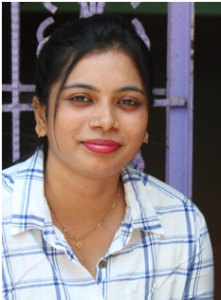 With an educational background in B.Com (Hons) and CA Inter, I was thrilled to take on the role of an accounting professional at CYSD. This position not only brought me joy and career satisfaction but also placed me in a nurturing environment surrounded by a supportive team that consistently encouraged me. During my time here, I acquired new skills, including proficiency in Spine software for managing the organisation’s assets, in addition to my existing experience with Tally to manage the day-to-day financial transactions.
With an educational background in B.Com (Hons) and CA Inter, I was thrilled to take on the role of an accounting professional at CYSD. This position not only brought me joy and career satisfaction but also placed me in a nurturing environment surrounded by a supportive team that consistently encouraged me. During my time here, I acquired new skills, including proficiency in Spine software for managing the organisation’s assets, in addition to my existing experience with Tally to manage the day-to-day financial transactions.
From the very beginning, CYSD’s office environment radiated positivity, peace, and a shared commitment to leadership and making a difference. During my induction, I had the privilege of personally meeting each of the organisation’s senior leaders. Their knowledge, insights, and words of encouragement greatly inspired me. Despite the initial nervousness that often comes with a new role, the unwavering support from my senior colleagues helped me overcome challenges and excel in my work.
One of the most rewarding aspects of working at CYSD is the organisation’s clear policies, structured approach, and well-defined procedures. These elements empower every individual to use their talents, innovate, and contribute meaningfully to society for a greater cause. The nature-friendly environment at CYSD fosters a culture of growth and respect for all individuals, regardless of women and men, making it a truly inclusive space. CYSD is a gender-sensitive workplace where no one faces discrimination based on gender.
The organisation ensures that everyone receives equal task loads and salaries, irrespective of gender, and I have always felt safe and respected here. Harassment of any kind is non-existent, which adds to the positive and secure atmosphere.
I am deeply grateful to respected Jagadananda Sir and all my senior colleagues for giving me the opportunity to join this incredible organisation. CYSD has become more than just a workplace; it is a place where I can thrive, contribute, and grow both personally and professionally.
~ Sidheswari Sahoo
In the heart of rural India, where child marriages are still common, Laba Barik is a symbol of change in Koraut district. His strong efforts to promote education and fight against child marriage have reshaped the narrative in his village of Padapadar in Dandabadi Gram Panchayat under Baipariguda block.
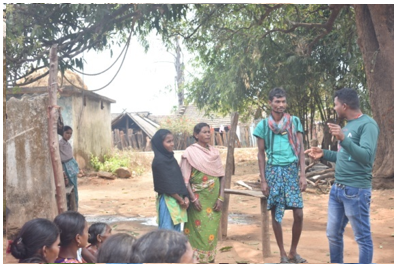 Laba’s journey began with a realisation: education is not only a path to personal growth but also a powerful tool to combat social issues like child marriage. As the first individual to complete Higher Secondary Education, (+2) in Padapadar, Laba understood the power of education firsthand. In Padapadar, a village with about 60 households, child marriages were common, with unions happening as early as age 15. The root causes were clear: a lack of awareness about adolescent health and the importance of education, along with poor educational infrastructure.
Laba’s journey began with a realisation: education is not only a path to personal growth but also a powerful tool to combat social issues like child marriage. As the first individual to complete Higher Secondary Education, (+2) in Padapadar, Laba understood the power of education firsthand. In Padapadar, a village with about 60 households, child marriages were common, with unions happening as early as age 15. The root causes were clear: a lack of awareness about adolescent health and the importance of education, along with poor educational infrastructure.
Determined to make a change, Laba worked hard to break these barriers. He raised awareness among villagers, using his education as a beacon of hope. Through collaborative efforts with Anganwadi workers, Laba started campaigns to educate parents about the harmful effects of child marriage and the invaluable benefits of formal education.
Despite initial resistance and scepticism, Laba’s hard work paid off. The village saw a significant drop in child marriages as parents became increasingly aware of the long-term repercussions. Moreover, Laba’s efforts helped marginalised children to access education. Now, three girls are enrolled in the Government Tribal Residential School and five others have overcome paperwork issues to attend local schools.
However, Laba’s mission is not without its challenges. The absence of birth certificates and Aadhaar cards makes it hard to enrol children in schools. Yet, Laba remains undeterred, looking for other ways to make sure every child’s right to education gets fulfilled.
Laba’s passion for education knows no limits. Even after finishing his schooling, he remains committed to empowering the next generation.
“I want the children in my village to receive formal education and utilise their knowledge to make a livelihood,” he says with conviction. As Laba continues to overcome obstacles and champion the cause of education, his impact reaches far beyond Padapadar.
~ Ashish Kumar Jalli
Amidst the verdant landscapes of Sisiaguda village, a young man has emerged as a catalyst for transformation. At just 25 years old, Khagapati Pujari has become a shining example for his community because of his unwavering dedication to improving their lives.
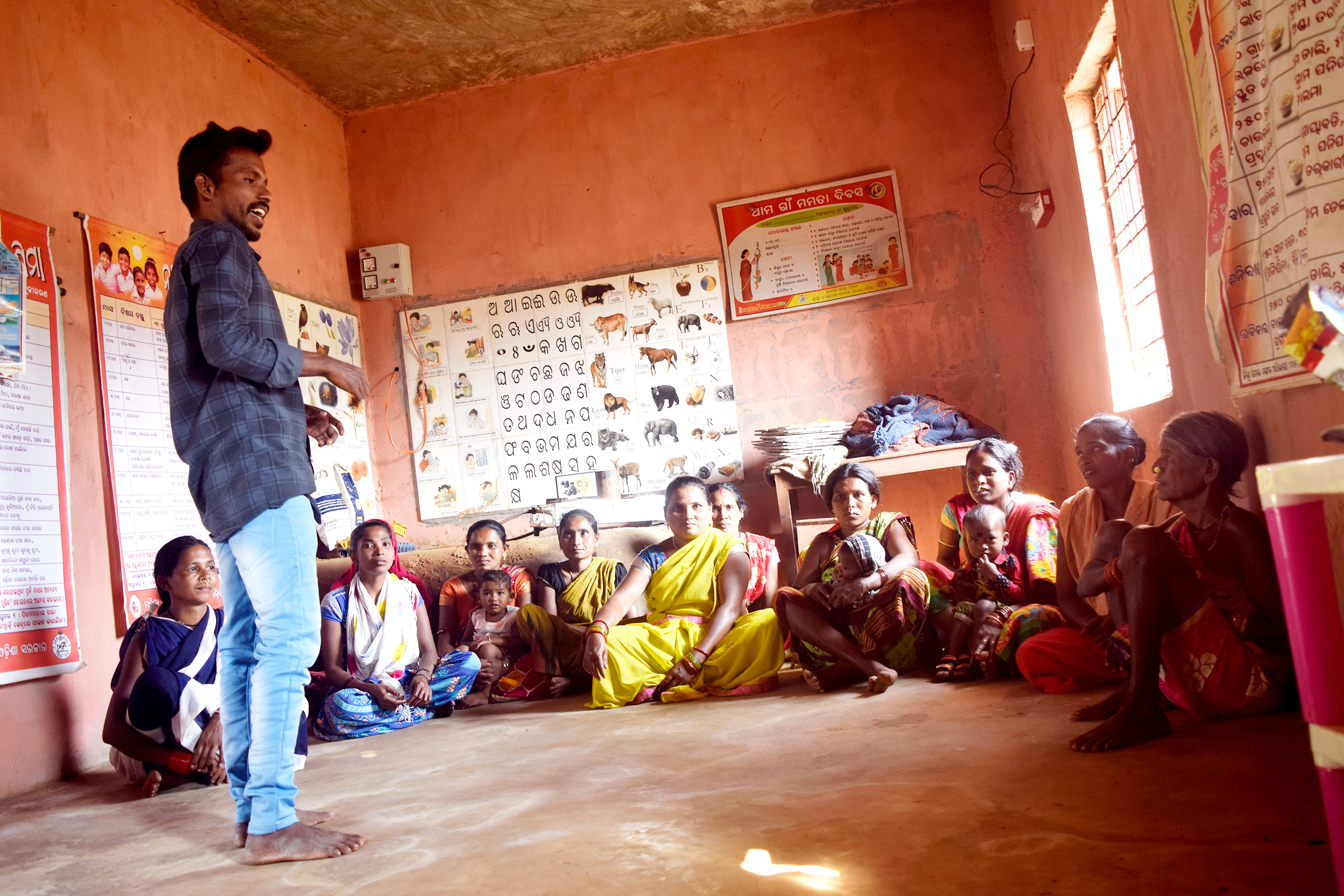
Situated within the Cherka Gram Panchayat of Boipariguda Block, Sisiaguda had long struggled with poor infrastructure and a lack of essential services. However, Khagapati, a Higher Secondary Education (+2) dropout, refused to accept the status quo and instead embarked on a mission to bring about positive change.
Read More: Sadan Muduli: Fighting against Child Marriage and Alcoholism
One of the major issues in Sisiaguda was the dysfunctional Anganwadi centre, depriving children of essential education and nutrition. Recognising this urgent need, Khagapati mobilised the women’s self-help group (SHG) members to take action. Together, they confronted local authorities, including the Sarpanch, and demanded the immediate reopening of the Anganwadi Centre. Undeterred by initial obstacles, Khagapati escalated the matter by lodging a formal complaint with the Child Development Project Officer (CDPO). His persistent efforts paid off when authorities intervened, ensuring the Anganwadi centre resumed its operations.
Today, thanks to Khagapati’s endeavour, 26 children are receiving the education and nutritional support they deserve. By ensuring a sustainable resolution, he upheld the rights of the village’s children.
However, Khagapati’s work didn’t stop there. He also spearheaded initiatives to fix the village’s poor infrastructure, particularly the rough roads. With strategic planning and collaboration with the Sarpanch and SHG members, he navigated bureaucratic processes to secure approval for the construction of two main roads. Khagapati’s determination to uplift his community shows in his pragmatic approach to problem-solving.
Reflecting on his endeavours, Khagapati emphasises the importance of collective action and community involvement. “I believe that true progress stems from unity and collaboration, echoing the sentiment that together, we can overcome any challenge,” says satisfying Khagapati.
~ Uppali Mohanty
In Dhirkuti slum of Bhubaneswar, Sumati Das, a 24-year-old woman, embodies the spirit of change as a Community Health Worker (Paramedic). Her journey from managing a household to a community health champion is a testament to the power of community-led initiatives and personal determination.
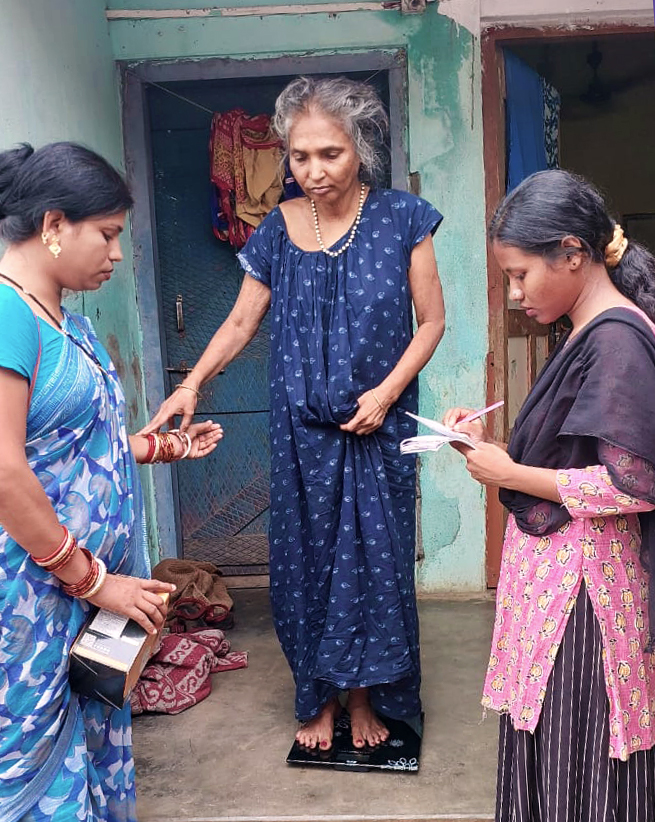 Sumati’s life was marked by hardship early on. In 2009, she lost her father, a tragedy that thrust her family into financial instability. Her mother, forced to become a daily wage labourer, struggled to make ends meet. Sumati, bearing the weight of household responsibilities, managed to complete her higher secondary education in 2014. However, financial constraints and time limitations made further studies an unattainable dream.
Sumati’s life was marked by hardship early on. In 2009, she lost her father, a tragedy that thrust her family into financial instability. Her mother, forced to become a daily wage labourer, struggled to make ends meet. Sumati, bearing the weight of household responsibilities, managed to complete her higher secondary education in 2014. However, financial constraints and time limitations made further studies an unattainable dream.
In the midst of these challenges, she was offered an opportunity to become a community volunteer. The project introduced a Community-Led Participatory Learning Approach (CLPLA), focusing on local health empowerment through the training of community women as Health Paramedics. Recognising her potential, the project offered to train her as a General Duty Assistant (GDA). Over three rigorous months, Sumati acquired essential healthcare skills, from understanding human anatomy to providing emergency first aid. This training, in collaboration with institutions like Upasana Trust and St. Joseph’s Seva Sadan Community College, equipped her to serve her community effectively.
Read More: Luku Darua: Championing Forest Conservation Amidst Conflict
Sumati’s responsibilities as a paramedic are diverse. She creates awareness about dietary practices and hygiene, conducts hygiene campaigns, provides emergency first aid, and encourages community members to avail of government schemes like the Biju Swasthya Kalyan Yojana. She faciliates Urban Health and Nutrition Day (UHND) activities, ensuring active community participation. Sumati’s engagement extends to counselling adolescents, guiding them on managing menstruation, proper nutrition, and the importance of immunisation.
One of Sumati’s notable contributions is her focus on the elderly. Observing that many elderly individuals were deprived of proper care, she made it her mission to visit households, check their vitals, and ensure they received necessary medical attention. Her counselling sessions with family members emphasised the importance of prioritising elderly health and recognising warning signs that required immediate medical intervention.
Sumati’s efforts have led to a significant shift in the community’s mindset. Initially, she had to persistently approach families to encourage vaccination and regular check-ups. Today, community members actively seek her out for health advice and assistance. Sumati is now respected in her neighbourhood and plays a crucial role in monitoring vitals and recommending appropriate medical services.
Sumati’s journey as a paramedic has not only empowered her community but also brought about personal growth. She takes immense satisfaction in seeing pregnant women and mothers taking proactive steps for their health and the well-being of their children. The community’s improved awareness and utilisation of government schemes fill her with pride. Looking ahead, Sumati aspires to work in a hospital, further enhancing her skills to better serve her community. Her journey exemplifies resilience, compassion, and an unwavering commitment to fostering well-being in the face of adversity.
The project “Promoting Health Seeking Behaviour among High-Risk Groups” in Dhirkuti has not only brightened Sumati’s life but also brought positive changes to the community. Together, they have created a supportive environment where everyone helps each other. Sumati Das stands as a beacon of hope, a testament to the transformative power of community-led initiatives and the indomitable spirit of individuals dedicated to making a difference.
~ Ashish Kumar Jalli
In the heart of Sindhiaguda village, part of Baligaon Panchayat lives Gangadhar Nayak—a catalyst for change and progress within his community. At 41 years old, Gangadhar shows the power of education and community involvement. His tireless efforts have significantly improved the local education system, aiming to bridge the gap between the village and its school.
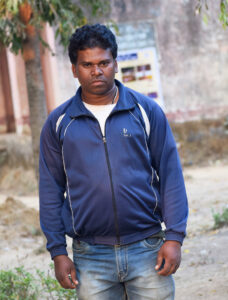 With unwavering dedication, he has led significant improvements in the local education landscape.Sindhiaguda village, largely home to the Bhumia tribe, dealt with the harsh reality of education being largely overlooked. Many children never attended school, and education was seen only as a provision to get basic necessities like lunch, clothes, and shoes. Gangadhar, one of the few educated individuals in the village, recognised the need for change and utilised the opportunity to make a difference.
With unwavering dedication, he has led significant improvements in the local education landscape.Sindhiaguda village, largely home to the Bhumia tribe, dealt with the harsh reality of education being largely overlooked. Many children never attended school, and education was seen only as a provision to get basic necessities like lunch, clothes, and shoes. Gangadhar, one of the few educated individuals in the village, recognised the need for change and utilised the opportunity to make a difference.
In 2022, Gangadhar became the President of the School Management Committee (SMC). He was determined to instil a sense of purpose and value for education within the community. With a clear vision, he set out to transform the village school and inspire a newfound appreciation for learning.
Despite being a parent to two children, Gangadhar’s commitment to the cause remained unwavering. He introduced innovative initiatives to foster parental involvement and improve the quality of education. Regular school visits by SMC members have ensured accountability and transparency. Special days for parents to attend classes have helped them to understand the educational process better.
Read More: Light at the End of the Tunnel!
Gangadhar believes that education gives every child the opportunity to realise their full potential and contribute meaningfully to society.Recognising the challenges posed by insufficient resources and teacher shortages, Gangadhar mobilised motivated youths to conduct supplementary classes, enriching students’ learning experience. His proactive approach extended beyond the school premises, persuading for improved infrastructure and essential amenities through active participation in Gram Sabha meetings and correspondence with educational authorities.
In January 2024, Gangadhar’s determination paid off when the villagers united to construct a playground for the school. This project, with the support from the sarpanch and inclusion in the Panchayat Development Plan, showcased how grassroots efforts can bring real change. The new playground stands as a symbol of the community’s collective effort towards educational advancement.
Moreover, the impact of Gangadhar’s initiatives transcended academic boundaries, fostering holistic development through events like the annual sports day and community science exhibition. By nurturing talent and promoting extracurricular activities, he aspires to minimise dropout rates and develop confident, skilled individuals who can represent their state in sports.Gangadhar’s journey exemplifies how grassroots leadership and community engagement can enhance educational outcomes in society.
~ Ananya Ipsita Misra
Seventy-six trainee Assistant Labour Officers (ALOs) on probation, visited the Centre for Youth and Social Development (CYSD) on 27th May 2024, as part of their Induction Training at the Gopabandhu Academy of Administration, Govt. of Odisha. The visit aimed to provide the officers with a comprehensive understanding of CYSD’s grassroots program interventions, activities and impacts. The interactive session began with the screening of a documentary film on CYSD’s 40-year journey. This was followed by a presentation detailing CYSD’s programs jointly by Shri Haris Chandra Singh, Chief Operating Officer and Shri Basant Kumar Nayak, Programme Director. The presentation highlighted the promotion of integrated farming system through practices of natural and agro-ecological farming to combat climate change; the role of the Migration Support Centres, set up in South Odisha, in protecting the rights and entitlements of migrants; and the Demographic Intelligence Unit’s work in analysing Odisha’s demographic trends to assess the State’s population growth by 2036.
 Then an interactive Q&A session followed, where ALOs inquired about CYSD’s efforts to address challenges faced by the agricultural labourers, particularly unorganised migrant workers. They were elaborately apprised of the initiatives undertaken to support labourers and migrant workers. In tribal areas like Balipeta village, Koraput District,
Then an interactive Q&A session followed, where ALOs inquired about CYSD’s efforts to address challenges faced by the agricultural labourers, particularly unorganised migrant workers. They were elaborately apprised of the initiatives undertaken to support labourers and migrant workers. In tribal areas like Balipeta village, Koraput District,
Read More: Laba Barik: A Crusader Against Child Marriage
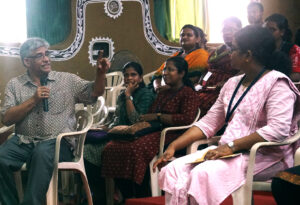
where many agricultural labourers migrate to cities for work, CYSD’s “Aaasa Aame Kaama Maagiba” campaign creates local employment opportunities. This program helps labourers to work on government projects at the Gram Panchayat level like pond & road constructions and pipe laying, thus reducing the need for migration. In many districts of South Odisha, CYSD has observed seasonal migration driven by poverty and social factors. Migrants, often working in the construction sites and agriculture sectors face poor living conditions and lack proper documentation. CYSD’s Migration Support Centre plays a crucial role by registering migrants at the Panchayat level, tracking their movements, providing necessary information and offering counselling.
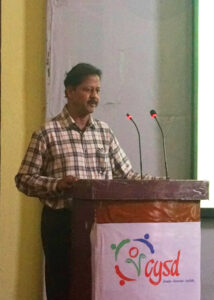 The ALOs suggested that NGOs like CYSD can help bridge the gap between Block-level Labour Departments and their peripheral communities, as ALOs are sometimes perceived as troublemakers. Furthermore, CYSD can assist in mapping the talents and skills of labourers in each district, which could benefit workers by matching them with suitable jobs based on their skill sets. Finally, the ALOs emphasized the need to raise awareness among labourers about the challenges of migration. By showcasing CYSD’s initiatives and addressing the queries raised by the ALOs, the session aimed to collaborate with the concerned Block-level ALOs to jointly support vulnerable communities and contribute to the sustainable development goals at the local level. Finally, the officers were advised to visit the Library-cum-Resource Centre of CYSD to explore if any referral publications or reports would be helpful in deepening their understanding of the relevant subject.
The ALOs suggested that NGOs like CYSD can help bridge the gap between Block-level Labour Departments and their peripheral communities, as ALOs are sometimes perceived as troublemakers. Furthermore, CYSD can assist in mapping the talents and skills of labourers in each district, which could benefit workers by matching them with suitable jobs based on their skill sets. Finally, the ALOs emphasized the need to raise awareness among labourers about the challenges of migration. By showcasing CYSD’s initiatives and addressing the queries raised by the ALOs, the session aimed to collaborate with the concerned Block-level ALOs to jointly support vulnerable communities and contribute to the sustainable development goals at the local level. Finally, the officers were advised to visit the Library-cum-Resource Centre of CYSD to explore if any referral publications or reports would be helpful in deepening their understanding of the relevant subject.
Child marriage remains a significant challenge in regions like Odisha, particularly among tribal communities. Despite legal restrictions and awareness efforts, underage marriages persist, leading to various social and economic consequences. In the midst of this, individuals like Sadan Muduli are emerging as champions of change, dedicating themselves to combatting harmful practices and uplifting their communities.
In Muduliguda village of Koraput district, Sadan Muduli has become a local hero, actively fighting against child marriage through education, activism, and community engagement. Recognising the urgent need for intervention, Sadan swiftly responded to cases like that of Tulabati Khilo, a 15-year-old girl facing pressure for early marriage. Through collaboration with local stakeholders and dissemination of legal information, Sadan successfully prevented Tulabati’s marriage, setting a positive example for the community.
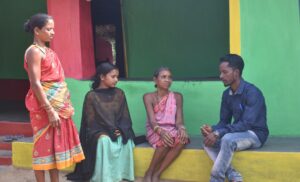 Beyond addressing child marriage, Sadan also focuses on public health, particularly alcohol abuse. Despite facing resistance, he led efforts to curb illicit liquor production and consumption in his village, promoting sobriety and community well-being. Sadan’s holistic approach demonstrates the power of grassroots activism and community solidarity in tackling entrenched issues.
Beyond addressing child marriage, Sadan also focuses on public health, particularly alcohol abuse. Despite facing resistance, he led efforts to curb illicit liquor production and consumption in his village, promoting sobriety and community well-being. Sadan’s holistic approach demonstrates the power of grassroots activism and community solidarity in tackling entrenched issues.
Reflecting on his journey, Sadan remains committed to serving his community and advocating for social justice. Through collaboration and persistence, he continues to make a positive impact, empowering individuals and fostering a culture of rights and dignity for all.
In the idyllic landscapes of Rayagada and Kalahandi districts in Odisha, a ray of hope shines bright for farmers seeking to elevate their agricultural practices and livelihoods. The Utkal Action for Agricultural Transformations (UANAT) Project, in collaboration with CYSD, emerges as this beacon of hope, supported by a significant infusion of 131.27 lakhs from the Horticulture Departments. Together, they embark on a transformative journey aimed at promoting cluster development and empowering farmers through a range of horticultural initiatives.
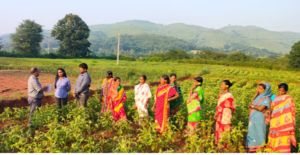 Agriculture isn’t just a way of life in the Kashipur block of Rayagada district and Th. Rampur block of Kalahandi district; it’s the lifeline for numerous families. Yet, challenges such as limited resources, outdated techniques, and poor market connections have held back their growth potential. Enter the UANAT Project, with its comprehensive approach and backing from the Horticulture Departments, poised to tackle these hurdles and pave the path for agricultural rejuvenation.
Agriculture isn’t just a way of life in the Kashipur block of Rayagada district and Th. Rampur block of Kalahandi district; it’s the lifeline for numerous families. Yet, challenges such as limited resources, outdated techniques, and poor market connections have held back their growth potential. Enter the UANAT Project, with its comprehensive approach and backing from the Horticulture Departments, poised to tackle these hurdles and pave the path for agricultural rejuvenation.
With support from the Horticulture Departments, the UANAT Project wastes no time in rolling out a series of tailored initiatives to address the unique needs of farmers in the region. Farmers receive guidance and assistance for cluster-based Khariff potato cultivation, embracing modern techniques for improved yields and quality. Additionally, 250 farmers benefit from support in rabi potato cultivation, gaining access to quality seeds, training, and essential inputs to boost productivity and income. Furthermore, 365 farmers receive high-quality vegetable seeds and subsidies, encouraging diversification and sustainable cultivation practices.
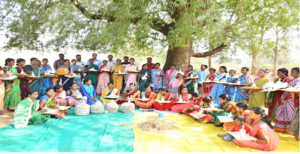 Moreover, 30 farmers undergo training and subsidy support for oyster mushroom cultivation, providing an alternative income source and nutritional boost. Additionally, 56 households venture into mango plantations, while 12 households receive support for banana cultivation, capitalising on the region’s favourable climate and enhancing household incomes. Lastly, 9 solar dryers are distributed to farmers, enabling the preservation of agricultural produce and reducing post-harvest losses.
Moreover, 30 farmers undergo training and subsidy support for oyster mushroom cultivation, providing an alternative income source and nutritional boost. Additionally, 56 households venture into mango plantations, while 12 households receive support for banana cultivation, capitalising on the region’s favourable climate and enhancing household incomes. Lastly, 9 solar dryers are distributed to farmers, enabling the preservation of agricultural produce and reducing post-harvest losses.
The collaboration between the UANAT Project and the Horticulture Departments triggers a remarkable shift in the agricultural landscape of Rayagada and Kalahandi districts. Farmers witness a notable uptick in productivity, income levels, and overall well-being. Cluster-based approaches foster collaboration and shared learning, nurturing a sense of community empowerment and resilience.
The initiatives spearheaded by the UANAT Project, with the backing of the Horticulture Departments, lay the groundwork for sustainable agricultural practices and economic prosperity in the region. By promoting diversification, strengthening market connections, and embracing innovation, farmers are equipped to thrive amidst evolving environmental and socio-economic dynamics.
The partnership between the UANAT Project and the Horticulture Departments stands as a testament to the transformative potential of collaborative efforts in driving agricultural progress and rural development. Through strategic investments, capacity-building endeavors, and tailored support, farmers in Rayagada and Kalahandi districts embark on a journey toward prosperity and resilience. As they continue to cultivate their lands and communities, the legacy of this collaboration will endure, inspiring future generations to cultivate the seeds of progress and prosperity.
In the vibrant heart of Thakurmunda, nestled within the lush landscapes of the Mayurbhanj district, a community of resilient Santal tribal women is rewriting the narrative of their livelihoods. Traditionally known for their craftsmanship in crafting disposable plates from shal leaves and gathering firewood from dense forests, these women have embarked on a new journey of entrepreneurship.
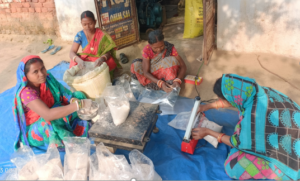 Empowered by the Odisha Millet Mission (OMM) and supported by CYSD, these women have embraced the indigenous wisdom of millet farming and production. With determination and limited resources, they formed the Sambandha Maa Duarasuni women’s group and ventured into millet flour production, defying economic odds.
Empowered by the Odisha Millet Mission (OMM) and supported by CYSD, these women have embraced the indigenous wisdom of millet farming and production. With determination and limited resources, they formed the Sambandha Maa Duarasuni women’s group and ventured into millet flour production, defying economic odds.
Initially faced with market challenges, these women found solace in the guidance of MFPCL and the Odisha Millet Mission. Through tailored training sessions on product development and marketing strategies, they honed their entrepreneurial skills and enhanced product quality.
With newfound confidence, these women set up temporary stalls, showcasing their meticulously crafted millet products to the local community. Establishing personal connections and highlighting the uniqueness of their offerings, they quickly garnered a loyal customer base.
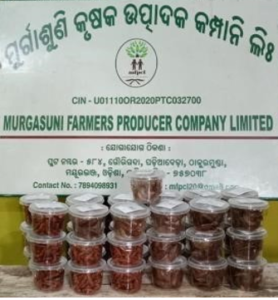 As demand soared, these enterprising women reinvested profits to expand their product range and improve their capabilities. With dreams of a permanent millet shop on the horizon, they are poised to make millets a household staple, one satisfied customer at a time. In the heart-warming journey of these Santal tribal women turned millet entrepreneurs lies a testament to the power of determination, resilience, and community support. As they continue to thrive and expand their business, their success not only uplifts their livelihoods but also contributes to the preservation of traditional knowledge and the promotion of healthier food choices. With each sale, they are not just selling products but also spreading the seeds of empowerment and sustainable living. As they look towards the future, their vision of a permanent millet shop symbolizes not just a place of commerce but also a beacon of hope and inspiration for generations to come.
As demand soared, these enterprising women reinvested profits to expand their product range and improve their capabilities. With dreams of a permanent millet shop on the horizon, they are poised to make millets a household staple, one satisfied customer at a time. In the heart-warming journey of these Santal tribal women turned millet entrepreneurs lies a testament to the power of determination, resilience, and community support. As they continue to thrive and expand their business, their success not only uplifts their livelihoods but also contributes to the preservation of traditional knowledge and the promotion of healthier food choices. With each sale, they are not just selling products but also spreading the seeds of empowerment and sustainable living. As they look towards the future, their vision of a permanent millet shop symbolizes not just a place of commerce but also a beacon of hope and inspiration for generations to come.